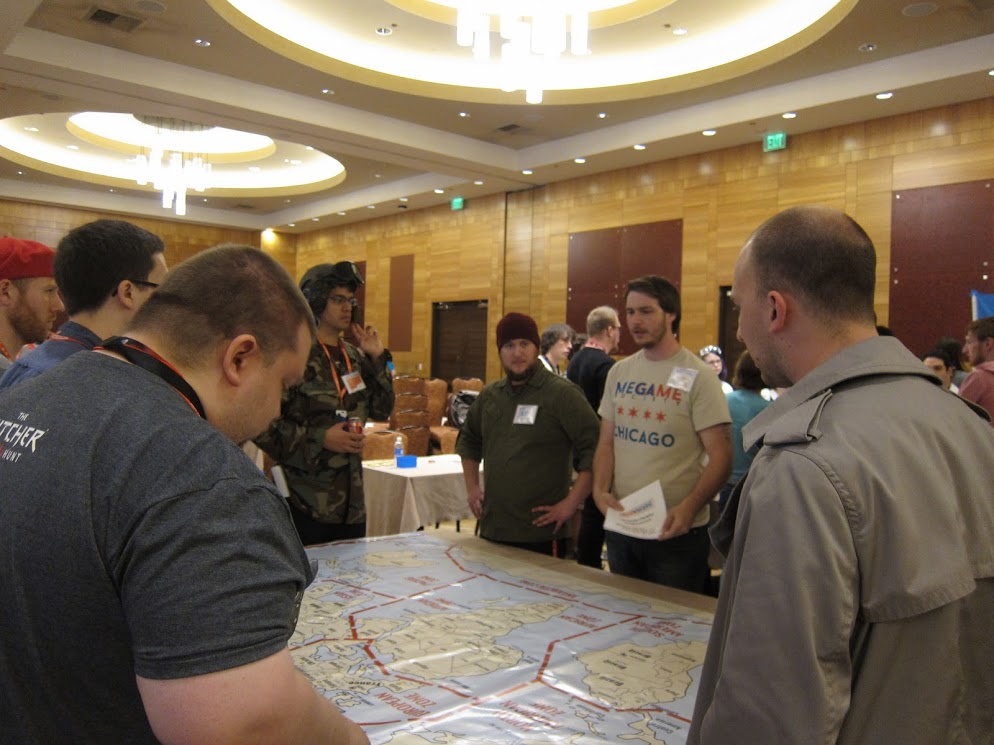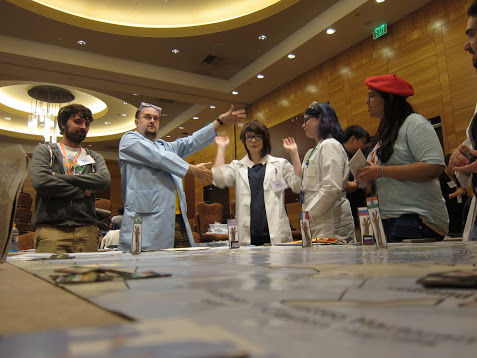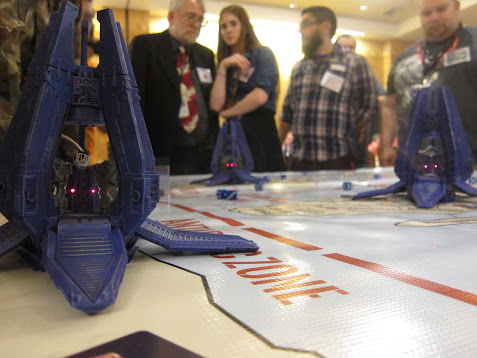Jesse Shepherd had been here before, but not on this scale. He and his friend Trond Nielson had envisioned a large-scale board game, something 15 people could play at once. On Aug. 8, 2015, he sat in the middle of the Theatre off Jackson in Seattle directing 60 players in the city’s first MegaGame.
A MegaGame is exactly what it sounds like: around 20 volunteers run an all-day experience for a group of players that’s part board game, part role-play and part social experiment. The genre of the game can vary; players are split into groups to negotiate the Treaty of Versailles or to investigate a Lovecraftian town. The MegaGame that caught Shepherd and friend’s attention was Watch the Skies, a game that has groups of five—each representing a country from across the world—responding to an alien invasion, played by a secretive group of other players.
A few years ago, MegaGames were the domain of a small group in the UK. That all changed in 2014 when popular board game site Shut Up and Sit Down produced a video showing off the intricate plotlines that evolve through a game of Watch the Skies. Many, like Shepherd, found the video and knew they had stumbled upon something special.
“My friend Trond Nielsen and I had designed a 15 player action board game sort of thing. We designed that a few years before we all started getting into MegaGames, so we were interested in this phenomena to begin with, but I hadn’t seen an example of a MegaGame done well until the Shut Up and Sit Down video, and we thought ‘wow, that’s it,’” Shepherd said. “MegaGames offer something you can’t get anywhere else.”
“This could be a pushback to a lot of video games offering single player experiences these days. I love it, but it can be an isolating experience. MegaGames are bringing people together, and [they] give you an opportunity to dress up and plan for this kind of special event. I compare them to puzzle escape, which are you and a group of friends working together.”

All photography by author.
Watch The Skies splits players into high-ranking government officials: a Head of State, a Deputy Head of State, a UN Ambassador, a Head Scientist and a Military Chief. Every role has its own unique mini-game to play with the opposing countries. Military Chiefs compete in a toned down version of Risk, UN Ambassadors get together to pass agendas and Scientists do a variety of activities to advance down a tech tree.
All of these games are monitored by Deputy Heads of State, who report to the Head of State. Each mini-game requires currency from your country, which is distributed by the Head of State, and there’s rarely enough to go around. During this time, a separate group of aliens are in their own corner of the venue, working on their own secretive goals.
Videos by VICE
And from there you just kind of go. Prior to the game, players receive specialized packets outlining their countries’ goals and attitude, but there are no real winners and losers; just a story to craft. Participants show up in costume, bring food representative of their country and put on stone cold negotiation faces to help create the world.
It’s August of 2015, I’ve just walked into my very first MegaGame as France’s Head of State, A wide-eyed doe in an ill-fitting blazer staring down four other players looking to me for guidance. I tell everyone to never leave any of our game materials unattended, anyone could take anything at any time, this is like the Wild West. We wouldn’t be the ones caught unprepared. A few minutes later, I notice no one else is taking such a precaution, I gain some confidence as a plan begins to form, I think even my blazer begins to fit better.
MegaGames are an evolution of the wider trend of social gaming, but have been around since the 70’s. They trace their roots to British designer Jim Wallman, who began designing war games in the 70’s with a grand scale in mind.
“It was kind of starting with the idea that it would be possible to do games with lots of people in teams in separate rooms with different objectives. That started off, they weren’t called MegaGames at that point, just another variant of war gaming,” Wallman said.
In the 1980s Wallman continued to develop games and gathered a small group of friends who enjoyed his creations. He stepped out of the war game realm and developed games about pirates and zombies. Since that time, Wallman estimates he’s developed over 80 games.
“Over the years, there was a steady, dedicated group of people who really got into this, but it never really got into the mainstream,” Wallman said.
That is, until the Shut Up and Sit Down video went up and Jim’s dedicated group of hundreds grew by the thousands.

“In 2014, we had this moment of change, which is when I did Watch the Skies, and at the same time Shut Up and Sit Down guys came and took part and made a video, and that was kind of a massive change. It went viral; it still is going viral.
“The London group had done some things out of London, but suddenly there are thousands of people who want to do MegaGames and there are loads of people all around the world. You are quite capable of not only taking the idea but running with it, creating their own games and drawing on our experience. So the first thing we did when the interest bloomed was making sure there were materials for people to set the idea up,” Wallman said.
I’m livid. My U.N ambassador has just been kicked out of a private meeting between the U.S and Britain. They think we’re in league with the aliens, which is only partly true. Letting my emotions get the best of me, I tell my assembled team it’s time to do the deed. We search the crevices of our pockets and compile a stack of stamps with British and American flags on them, stolen earlier in the game. These stamps serve as proof that communications with aliens are coming from their respective countries. “Nothing too crazy, make it look legitimate,” I tell my Military Commander as we begin forging notes.
The burst in popularity was an unexpected development for the MegaGame Makers. The games were something the group did in their free time. They weren’t prepared to help people run them all over the world. This is where Noam Strassfeld and his partners at the New York MegaGame Society come into play. The group became the first outside of the UK to run a MegaGame after seeing the Shut Up and Sit Down Video.
“It was built as a hobby for this core group out in England, and that core group was really interested in LARPING, so the rules were lax. A lot were kind of in Jim’s head,” Strassfeld said, “so I ended up hammering him with questions.”
Strassfeld, with the help of Technologist Kevin Chang and artists Ramin Rahni, Juliet Hitchner, and Will Verdoni, scheduled their first MegaGame for six weeks after they purchased the materials.
“It was a fun experience, but it was a fun experience in, like, if you never played any board games and you played Monopoly and you’re like, ‘a game with other people, this is amazing!’ and after you know a little bit more about games you kind of go, ‘well actually, this is kind of not a great game.” Strassfeld said. “I have the personality where I want everyone to be happy all the time. I was upset because I felt like I ran this thing and it was kind of fun, but it really wasn’t.”
I’m in an unfamiliar part of the theater, my heart is beating out of my chest, late in the game myself and my war minister have secured a confidential meeting with an alien player. We only have a few minutes, I ask the most pressing question: Why are you here? I’m told that humans are immune to a disease that is ravaging their species, that they need corpses sent to them for study, in turn they would provide technological advancements beyond our wildest dreams. I tell the alien I need to take this information back to my cabinet before we can make a deal and decide to throw in a question another human nation had begged me to ask.
“America would like to have a meeting with you as well.”
“With notes like this being sent, that won’t happen any time soon.”
He pulls out a notecard affixed with the American Flag. Written in big, childlike penmanship I know can only come from my war minster are the words “KILL.MURDER.DESTROY.” We are told our meeting time is up.

Strassfeld began the process of modernizing the ruleset to make it more game-like. Players would have consequences in their roles. UN Ambassadors would pass resolutions that would affect other aspects of the game. Every role would influence a country’s PR level, impacting funds in a tangible way. The rulebook also got a redesign, including art and a more concrete ruleset. Wallman began to refer curious potential MegaGame players to Strassfeld, who now had a full set of materials needed to run the game.
The New York team soon helped groups in Chicago, Quebec and Seattle get their own Watch the Skies games going. While all these groups had the basic New York Framework, every game had its own unique feel. Shepherd’s group, a team of professional engineers, developed worksheets to easily track player input-outputs and generally tried to streamline their game.
“It’s fascinating to see how Noam and others have taken the basic idea and played many different riffs on it. You can still have the MegaGame feel. The game a lot of people play is unlike anything I would have come up with. For me, the whole point is people get together, interact, they have a laugh and they do some negotiating and a little bit of roleplaying and they have a problem to solve and all that. As long as that goes on, I’m really happy,” Wallman said.
Chaos has broken out across the world. I assure the press the aliens are friendly, they ask me how I feel about the millions of Americans that have been wiped out by the extraterrestrial visitors, my mistake will be plastered all over the papers. I sit down and receive a note from the aliens. We are told to evacuate immediately, another alien race is coming to extinguish our little light in the universe. We make plans to get our whole country off planet with the extraterrestrial help, starting with me.
Our plans are interrupted by the entire U.N taking the stage after a private meeting. They announce they have unanimously voted to engage in open war with our alien friends. This is out of character for our ambassador, he announces the aliens made severe threats that necessitated an immediate reaction. The aliens’ Game Manager approaches and asks who on our team is boarding the saucer for evacuation. My ambassador begs me not to go, its certain death. Something is very wrong. I say I’m going, and am led to the Alien Base on the other side of the theater.
As I approach the aliens, I ask if I’m dead. It turns out I’m not. According to the aliens, the entire U.N had been brainwashed earlier in the game, following the orders of the quickly approaching parasitic race to sow chaos among the world. It worked: America, Britain and Japan were waging open war against the aliens, and were attacking the mothership where evacuees were seeking refuge. I write a note to the rest of my staff, telling them it’s ok to evacuate, then I wait. I feel some concern when I learn the aliens had attached rockets to the moon to crash into Brazil, but in the end, I feel like the right call was made. Eventually, the rest of my team, sans our brainwashed ambassador, joins me in an increasingly crowded alien room.
Since their August 2015 debut, Seattle MegaGames (run by Shepherd, Nelson, Evan Lewis, Witt Yao and Clayton Hughes) has run four additional games—including two at PAX West—to benefit the Child’s Play charity, with all proceeds going to the organization.

For their first game, the Seattle Group didn’t want to rock the boat too much. A large part of preparation for the event would go into the creation of materials. When all was said and done, the group had spent nearly $3000 on the first game. Subsequent games would run around $1500-$2000, mostly from venue cost. Tickets in Seattle have ranged from $50-$60 with 10 percent of the proceeds going back to New York MegaGames.
While most of the profit goes to the cost of venues and lunch for every player, the team has been able to form a small “war chest” to make the games bigger and better. Tickets normally go on sale about a month before a game, and their latest game sold out in a little over 14 hours.
At the end of a MegaGame, players and volunteers alike will often sit around, just discussing what happened throughout the day. The thing with a MegaGame is that everyone gets to feel like a main player in their own little story, and those little stories make up the grand narrative of the game. A discussion of the day leads to threads forming between players, and the big picture firmly comes into view over a couple of drinks.
The last turn comes down to a dice roll. Japan has developed a giant mecha capable of taking down the alien mothership and led the human alliance in a massive space battle against the refugees and aliens. Ships slowly disappeared in what was essentially a gigantic risk battle, eventually just the mothership and mecha remained.
A single roll off would determine the fate of every nation. Japan rolled a 5, the aliens rolled a 6 and the Mecha Kitty, and the atmosphere of the room, exploded. France, Russia, and India would take off to the stars, China had developed an underground bunker to survive the oncoming hostile alien onslaught. Brazil would also take to the stars, albeit in a poorly constructed spacecraft that had a few oxygen leaks. Japan, Britain and America would presumably be decimated by remaining on the Earth’s surface.
“It’s a game that is not something you can experience anywhere else. You go there and plan for this destination gaming event to go and have a good time. MegaGames are riding on that same sort of energy that a puzzle room does. When you’re done with a MegaGame, you can tell stories about what you’ve done and you’re there with a bunch of people who have volunteered their time to help craft this shared narrative with you. When you get to the end, you created something with a bunch of awesome people and you can share that story with anyone,” Shepherd said.
While Watch the Skies has been the go-to MegaGame, others are starting to pop up stateside. The Chicago group has been creating their own zombie apocalypse game, and New York has been hard at work at their own Lovecraft-inspired tale. Wallman continues to create MegaGames, and has been working on a special project that could potentially see this global network working together.
Wallman envisions adapting a zombie scenario on a Federal level, with groups of players representing state-agencies in a zombie apocalypse, and how they would work together in the face of an unprecedented crisis.
“Unfortunately, the American system of managing disasters is incredibly rich in conflict, and that’s bad for efficiency, but from a MegaGame point of view, it’s absolutely brilliant,” Wallman said.
More than this, Wallman sees the game as an opportunity to develop what he calls a “wide area MegaGame:” multiple games would be going on at the same time all around the world, with each game representing a different state. Not only would groups of players within one game have to deal with their immediate neighbors, but also groups in other states entirely, with a federal group overseeing everything.
The logistical problems would be quite intense, but it’s something Wallman has been building to for quite some time. Over the last couple of years, he has run games of Watch the Skies with over 300. When someone asked Wallman about a potential 1,000 player MegaGame, the wide area idea was born.
If you are interested in setting up your own MegaGame, be sure to follow the MegaGame Society on Facebook.
I recount this story countless times in the following months, but what makes a MegaGame special is this is not the whole story. It stands on its own, but it’s just a small piece of the pie, part of something greater.
We hardly ever spoke to China, and had no idea they spent a large portion of the game burrowing underground and becoming a subterranean people. When the U.S Vice President would recount his story, I had no idea that our vindictive (and definitely against the rules) notes would have on his game. We all had a narrative, we were all the center of attention in our own little corners, and it’s a feeling like none other.
More
From VICE
-

Screenshot: Robin Entertainment -

Screenshot: Shaun Cichacki -

Screenshot: Shaun Cichacki -

Screenshots: Majesco Entertainment, Xbox Game Studios
